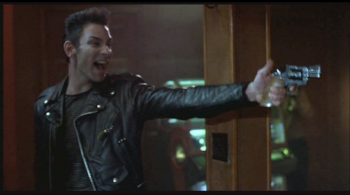Beholding Bigelow: The Loveless
With Kathryn Bigelow's latest film, DETROIT, opening wide recently, I am revisiting this project that I sadly left unfinished several years earlier. This installment is being published for the first time.
The Film: The Loveless
The Year: Dates vary, anywhere between 1981-1984 with 1982 been the most commonly cited
The Plot: Bikers descend on a small town, first Vance (Willem Dafoe) then the rest of his small posse. They behave badly, in a largely vague way, and disrupt the social order, revealing a not so hidden corruption under the town’s surface.
The Issues: The 50’s were not a time of purity- As with many movies of the 70’s, LOVELESS sets about to pop the bubble on the 50’s as a sort of platonic ideal of American life. The difference here is LOVELESS is doing it ever harder as it seems aware it is tangling with the notion on the eve of President Reagan’s ascension to sainthood and the glorification of the 50’s truly taking hold as the dominant narrative of conservatives along with him.
So color coordinated. (thehollywoodproject.wordpress.com)
Who is the biggest threat: society or the outsiders?- At the start of the movie Vance and his gang are clearly the villains. Young, ill-tempered, possibly boasting a sociopath or two in their ranks. However, the longer they stay the clearer it becomes that this small town (like all small towns, like society) is hardly devoid of its own dangers. If society is bad, can those who seek to derail it, even if it is just for fun, truly be the villains?
Men trying to control women- This connects with above. Again, it initially appears Debbie (Tina L'Hotsky)—the biker gang’s moll—is the example of this as she is bossed around by everyone, especially her seeming boyfriend Davis (Robert Gordon) arguably the least seemly of the group. Vance’s treatment of the town’s only diner’s young waitress furthers this.
However, as the picture comes together, we see that Telena’s (Marin Kanter) father asserts far more power over her—and by implication, her dead via suicide mother—than the biker gang exerts on anyone.
Sex as power- Telena recognizes her sexuality gives her power, give her independence, and cares not for what people say about her because she values that strength more than a reputation. He father, on the other, cannot handle the “loss” of her to adulthood as signified to this wielding of sexuality.
Vance, on the other hand, using sex as a weapon to scare and intimidate others, be they men or women. His sexuality is all implicit threat.
The sex as threat thing is subtle but you can pick up on it if you pay close attention. (thefilmexperience.net)
Interestingly, it is Telena who triumphs over Vance in their encounter as she is not intimidated by his “weapon” and near as we can tell enjoys her sexual encounter with him.
The Opinion: Imagine your senior film dissertation also is Willem Dafoe’s first onscreen work? So it is was for Kathryn Bigelow (co-writing and directing with frequent David Lynch collaborator Monty Montgomery). Only Brian DePalma getting Robert DeNiro for his film school pictures sticks out as having a better first actor muse.
And both parties—Dafoe and Bigelow—show up ready for the debut. Dafoe’s Vance might as well be a serpent for the way he moves on screen and the coiled menace he portrays; not to mention a young Dafoe looked very cobra-like indeed. Bigelow is already putting her fingerprints on the work as well with an appropriate for the story but still unique style that seems remarkably assured for someone, essentially, making a student film.
This man is just exercising his Second Amendment rights (robertgordon.dk)
Marin Kanter’s Telena is a nice balance for Dafoe, all sly and hypnotic smirks. She does not spar with Vance, per se, but she parries everything he throws at her, seemingly without breaking a sweat.
Bigelow’s style and the films odd pacing lend the movie a kind of dream like quality. At points there is a temptation to imagine that the town is a kind of purgatory that robs all that enter of the drive to move on. How else to explain why the pedal to the medal biker gang suddenly seems to lose all momentum in the town lines and the several young women who seem to long for escape but resist even considering a plan?
The central theme of corruption in America’s heartland is compelling but unfortunately the town folk are pretty paper thin. When Telena’s father is revealed to be the controlling, abusive, possibly sexually abusive monster, it is less frightening or shocking and more just totally out of nowhere. We were never given a reason to think he was a good person so the reveal holds little punch. He was a blank slate before they told us he was a villain so we never had a chance to think otherwise.
The Conclusion: An assured debut by a great actor and a great director. Marin Kanter’s performance made me wish she did more and makes me want to seek out the little she did do. However, even the haunting dreamlike quality of LOVELESS cannot stop it from being a bit of a draggy affair populated mostly by two-dimensional characters.
TFW Gajje likes your performance but maybe isn't so hype about your movie. (amazon.com)




